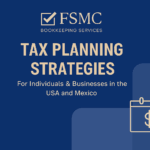
Cross Border Tax Planning Topics to Consider
October 4, 2025
Property Taxes: Tips Every Homeowner Should Know
October 4, 2025What Are Estate Taxes and What You Need to Know
A Complete Guide for 2025
By: FSMC Bookkeeping Services

Introduction
If you own significant assets—real estate, investments, business interests, or other property—you may eventually face estate taxes. Understanding how estate taxes work, how gift tax and annual exclusions factor in, and how to leverage gifting strategies (within IRS rules) can help you preserve more of your wealth for heirs. In this guide, we’ll break down the basics, reference the latest IRS rules, and explain how gifting can help you reduce estate tax exposure.
This article is particularly useful for business owners, individuals with real estate holdings, or anyone planning their legacy (and it aligns with FSMC QuickBooks’s focus on helping clients with financial clarity and tax-savvy decisions).
What Are Estate Taxes?
Estate tax is a tax on your right to transfer property at your death. It’s calculated based on the total value of your “gross estate” plus certain adjustments. IRS+2IRS+2
Here’s how it works in simple terms:
-
Gross estate: When you pass away, the IRS looks at everything you own or have interest in—real estate, investments, business interests, life insurance proceeds (if owned), retirement accounts (to some extent), and other property. IRS+3IRS+3IRS+3
-
Adjustments and deductions: Certain debts, funeral costs, administrative expenses, and permitted deductions (like property passing to a surviving spouse or qualified charities) reduce the taxable estate. IRS+2IRS+2
-
Exemption / exclusion: The IRS allows a “basic exclusion amount” (sometimes called the unified credit or lifetime exclusion) that shields a large portion of your estate from tax. IRS+5IRS+5IRS+5
-
Tax owed: After subtracting deductions and applying the exclusion, the remaining taxable estate is subject to estate tax (typically using the schedule in IRS rules). IRS+2IRS+2
Who Must File an Estate Tax Return?
Not everyone pays estate tax or even files a return. According to the IRS:
-
A return (Form 706) must generally be filed if the gross estate plus adjusted taxable gifts exceeds the filing threshold in the year of death. IRS+2IRS+2
-
The return is due nine months after death, though a six-month extension is possible if filed timely. IRS+1
-
If the decedent’s estate is below the threshold (i.e. modest estates), a return may not be required. IRS+2IRS+2
The threshold and exclusion amounts change over time (and are affected by tax law). IRS+2IRS+2
What Is Gift Tax and How It Relates
Gift tax is a tax on the transfer of property (including money) by one individual to another while receiving nothing or less than full value in return. IRS+2IRS+2
Key points:
-
The giver (donor) is responsible for any gift tax, not the recipient. IRS+2IRS+2
-
Many gifts are not taxable because of annual exclusions (i.e. you can give up to a set amount per recipient per year without triggering gift tax). IRS+3IRS+3IRS+3
-
If your gift to a given individual in a year exceeds the exclusion, you must file Form 709, United States Gift (and Generation-Skipping Transfer) Tax Return. However, you may not owe tax if you haven’t exhausted your lifetime exclusion. IRS+3IRS+3IRS+3
-
The IRS treats estate and gift taxes under a unified system, meaning gifts made during life reduce your available exclusion for estate tax at death. IRS+4IRS+4IRS+4
Annual Gift Exclusion & Limits (2024–2025)
One of the most useful tools for estate planning is the annual gift tax exclusion. This allows you to gift a certain amount per person each year without it counting toward your lifetime exclusion or triggering a gift tax return (if under the limit). IRS+3IRS+3IRS+3
Some relevant figures:
-
For 2024, the annual gift tax exclusion is $18,000 per donee (recipient). IRS+2IRS+2
-
For 2025, that number increases to $19,000 per person. IRS+2NerdWallet+2
-
Married couples can “split gifts”, effectively giving $19,000 each (for a total of $38,000) to one recipient without triggering a gift tax return. IRS+3NerdWallet+3IRS+3
If you give more than the exclusion to a person, you must file Form 709 to report the excess. But that excess amount typically reduces your lifetime exclusion—it does not immediately mean you pay tax. IRS+3IRS+3IRS+3
As of current law, the lifetime (or “basic”) exclusion is quite high—meaning that most individuals, even with large estates, may never owe federal estate or gift tax. IRS+3IRS+3IRS+3
Note: After 2025, there is scheduled to be a rollback in exclusion amounts under current tax law (though recent IRS regulations suggest the increased exclusions for 2018–2025 won’t penalize earlier gifts). IRS+2IRS+2
Suggested Annual Gift Strategy (Example)
To illustrate how gifting can help you reduce your eventual estate tax exposure, here is a strategy using the annual exclusion:
Example: Gifting $19,000 per year (2025 limit)
Suppose you have two children and wish to transfer some wealth gradually:
-
You gift $19,000 to Child A (2025 exclusion).
-
You gift $19,000 to Child B.
These gifts (if you don’t exceed the annual limit) require no gift tax, and you do not have to file Form 709 for those gifts.
Because those gifts are outside (i.e. excluded), they reduce the future value of your estate without eating into your lifetime exclusion.
If your estate is large and could face an estate tax in the future, using your full annual exclusion each year can gradually shift value out of your taxable estate.
If your estate is extremely large, you might also consider gifts above the annual exclusion, filing a gift tax return (Form 709) and using up part of your lifetime exemption while the law is favorable.
How Gifting Can Help Avoid or Reduce Estate Taxes
Here’s why gifting is a powerful tool for estate tax planning:
-
Shrink the taxable estate over time
Every dollar you gift (within exclusion or via lifetime exemption) reduces your future estate’s size, lowering the potential estate tax burden. -
Use the annual exclusion fully
You can gift up to $19,000 per person per year (2025) without affecting your lifetime exclusion. This uses the gift exclusion effectively. -
Reduce the “growth on the gift”
If you gift an asset now, future appreciation happens outside your estate (i.e. the growth accrues to the donee). -
Manage tax risk in a changing environment
Given that the exclusion amounts may roll back after 2025, making gifts before reductions occur may lock in more favorable treatment. IRS+2IRS+2 -
Combine with other planning techniques
Gifting can complement trusts, charitable giving, life insurance planning, and more sophisticated estate planning.
However, gifting has limits and risks:
-
Overly large gifts above the annual exclusion must be reported on Form 709. IRS+3IRS+3IRS+3
-
Gifts reduce your available lifetime exclusion—if you gift too aggressively, you might exhaust your ability to shield part of your estate later.
-
You must ensure the gift is truly a gift (no hidden strings or retention of control) or IRS may challenge it.
-
State-level estate taxes or inheritance taxes (in some states) may have differing rules.
Filing & Compliance (IRS Rules)
-
Form 706: Estate tax return filed by the executor within nine months after death (extension available). IRS+2IRS+2
-
Form 709: Donors file this gift tax return for gifts exceeding the annual exclusion. IRS+2IRS+2
-
Gifts under the annual exclusion do not require Form 709. IRS+2IRS+2
-
Any taxes owed (if lifetime exclusion is exceeded) would be paid by the donor or by the estate.
-
The IRS periodically updates rules and thresholds, so stay current with IRS publications. IRS+2IRS+2
Conclusion
Estate taxes and gift taxes can seem complicated, but understanding the core principles—and leveraging gifting within IRS rules—can help you protect your legacy and reduce tax burden on your heirs. By using the annual exclusion strategically (for example, gifting $19,000 per recipient in 2025), you can gradually shrink your taxable estate without triggering gift tax.
Always keep up with the IRS’s changing rules (e.g. exclusion amounts, filing requirements) and consult a qualified tax or estate planning advisor to tailor strategies to your situation.
If you’re a business owner or individual and need help analyzing your financial picture, understanding your estate, or planning tax-efficient transfers, FSMC Bookkeeping is here to support you with a team of experts including CPAs, Tax Accountants, and more. Feel free to contact us for guidance on tax-sensitive planning.
Ready to Plan Your Estate?
Estate and gift tax rules can be complex, but the right strategy can save your family significant costs in the future. Don’t leave your legacy to chance—work with professionals who understand the IRS rules and how to apply them to your unique situation.
👉 Schedule a Consultation with FSMC Bookkeeping Services today and let us help you create a tax-efficient estate plan that protects your wealth and secures peace of mind.
#EstateTaxes #GiftTax #TaxPlanning #WealthManagement #IRS #FinancialPlanning #EstatePlanning

